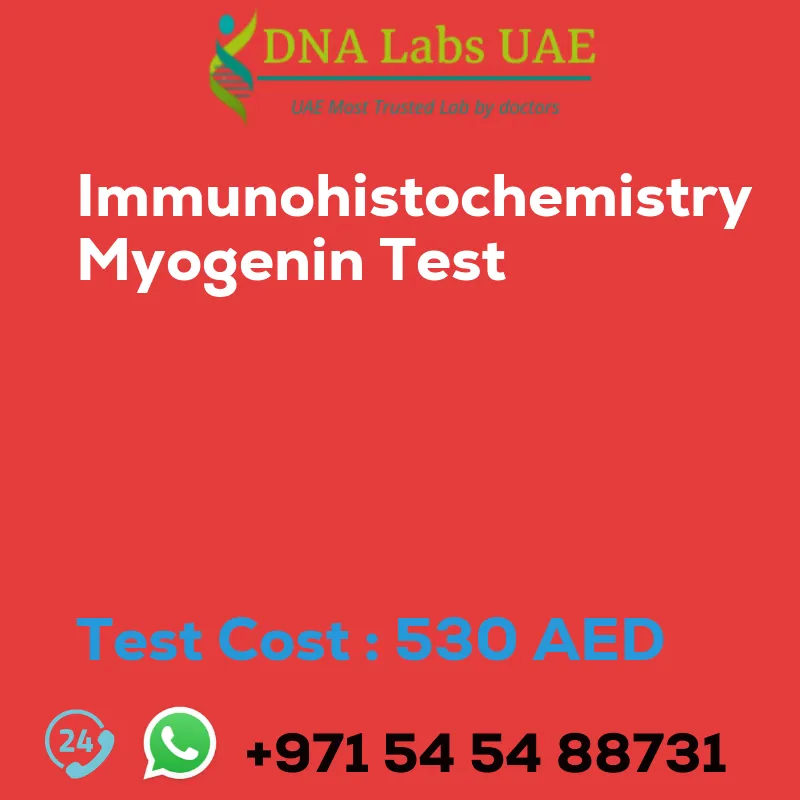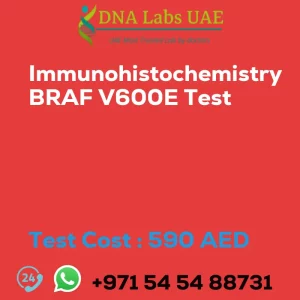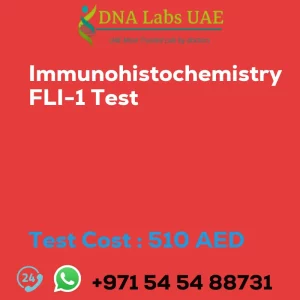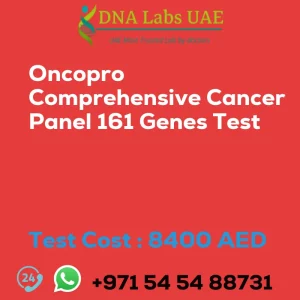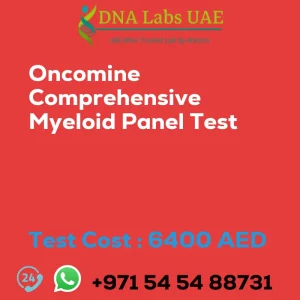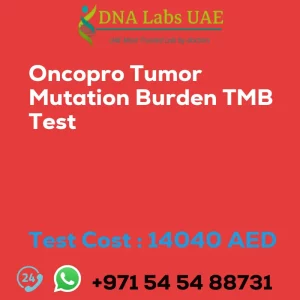IMMUNOHISTOCHEMISTRY MYOGENIN Test
At DNA Labs UAE, we offer the IMMUNOHISTOCHEMISTRY MYOGENIN Test to help diagnose and classify muscle-related disorders. This test detects the presence of myogenin protein in tissue samples, which plays a crucial role in the development and differentiation of skeletal muscle cells.
Test Details
The IMMUNOHISTOCHEMISTRY MYOGENIN Test is performed using specific antibodies that bind to the myogenin protein in the tissue sample. These antibodies are tagged with a colored or fluorescent marker, allowing for visualization of the protein under a microscope.
The test is commonly used in the diagnosis of various muscle-related disorders, including muscular dystrophy and rhabdomyosarcoma. It helps distinguish between normal and abnormal muscle cells and identifies the specific type of muscle cell present in the tissue sample.
Test Cost
The cost of the IMMUNOHISTOCHEMISTRY MYOGENIN Test at DNA Labs UAE is AED 530.0.
Sample Requirements
To perform the test, please submit tumor tissue in 10% Formal-saline or a Formalin-fixed paraffin-embedded block. Ship the sample at room temperature. Additionally, provide a copy of the Histopathology report, the site of biopsy, and the clinical history.
Report Delivery
The report for the IMMUNOHISTOCHEMISTRY MYOGENIN Test is delivered daily by 6 pm. The turnaround time is 5 days for blocks and tissue biopsies, and 7 days for large complex tissues.
Method
The IMMUNOHISTOCHEMISTRY MYOGENIN Test is performed using immunohistochemistry, a technique that involves staining tissue sections with specific antibodies to detect the myogenin protein.
Test Type
The IMMUNOHISTOCHEMISTRY MYOGENIN Test is a diagnostic tool for cancer, commonly used in the diagnosis and classification of muscle-related disorders.
Doctors
The IMMUNOHISTOCHEMISTRY MYOGENIN Test is typically ordered by oncologists and pathologists.
Pre Test Information
Before performing the test, please provide a copy of the Histopathology report, the site of biopsy, and the clinical history.
Procedure
The IMMUNOHISTOCHEMISTRY MYOGENIN Test is performed on formalin-fixed, paraffin-embedded tissue sections. The tissue is cut into thin sections and mounted on glass slides. The sections are then deparaffinized and rehydrated to remove the wax and prepare them for antibody staining.
Next, the tissue sections are treated with an antigen retrieval solution to unmask the myogenin protein and enhance antibody binding. The sections are then incubated with the primary antibody against myogenin, followed by a secondary antibody that is tagged with a colored or fluorescent marker.
After incubation, the slides are washed to remove any unbound antibodies, and a counterstain may be applied to visualize the tissue structure. Finally, the slides are examined under a microscope to assess the presence and distribution of myogenin protein in the tissue sample.
Results
The results of the IMMUNOHISTOCHEMISTRY MYOGENIN Test are reported as positive or negative, indicating the presence or absence of myogenin protein in the tissue sample. The intensity and distribution of staining may also be evaluated to provide additional information about muscle cell differentiation and pathology.
Conclusion
The IMMUNOHISTOCHEMISTRY MYOGENIN Test is a valuable tool in the diagnosis and classification of muscle-related disorders. It provides important information for patient management and treatment decisions.
| Test Name | IMMUNOHISTOCHEMISTRY MYOGENIN Test |
|---|---|
| Components | |
| Price | 530.0 AED |
| Sample Condition | Submit tumor tissue in 10% Formal-saline OR Formalin fixed paraffin embedded block. Ship at room temperature. Provide a copy of the Histopathology report, Site of biopsy and Clinical history. |
| Report Delivery | Sample Daily by 6 pm; Report Block: 5 days Tissue Biopsy: 5 days Tissue large complex : 7 days |
| Method | Immunohistochemistry |
| Test type | Cancer |
| Doctor | Oncologist, Pathologist |
| Test Department: | |
| Pre Test Information | Provide a copy of the Histopathology report, Site of biopsy and Clinical history. |
| Test Details |
Immunohistochemistry (IHC) Myogenin test is a diagnostic tool used to detect the presence of myogenin protein in tissue samples. Myogenin is a transcription factor that plays a crucial role in the development and differentiation of skeletal muscle cells. The IHC Myogenin test involves the use of specific antibodies that bind to the myogenin protein in the tissue sample. These antibodies are usually tagged with a colored or fluorescent marker, which allows for visualization of the protein under a microscope. The test is commonly used in the diagnosis of various muscle-related disorders, such as muscular dystrophy and rhabdomyosarcoma. It helps in distinguishing between normal and abnormal muscle cells and identifying the specific type of muscle cell present in the tissue sample. The IHC Myogenin test is performed on formalin-fixed, paraffin-embedded tissue sections. The tissue is first cut into thin sections and mounted on glass slides. The sections are then deparaffinized and rehydrated to remove the wax and prepare them for antibody staining. Next, the tissue sections are treated with an antigen retrieval solution to unmask the myogenin protein and enhance antibody binding. The sections are then incubated with the primary antibody against myogenin, followed by a secondary antibody that is tagged with a colored or fluorescent marker. After incubation, the slides are washed to remove any unbound antibodies, and a counterstain may be applied to visualize the tissue structure. Finally, the slides are examined under a microscope to assess the presence and distribution of myogenin protein in the tissue sample. The results of the IHC Myogenin test are typically reported as positive or negative, indicating the presence or absence of myogenin protein in the tissue sample. The intensity and distribution of staining may also be evaluated to provide additional information about the muscle cell differentiation and pathology. Overall, the IHC Myogenin test is a valuable tool in the diagnosis and classification of muscle-related disorders, providing important information for patient management and treatment decisions. |

